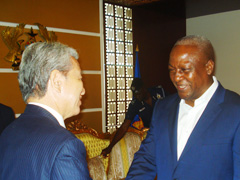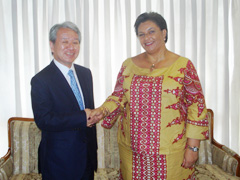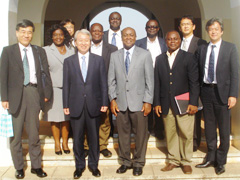On March 13, JICA President Akihiko Tanaka arrived in Ghana, the seventh country he has visited in Sub-Saharan Africa [1] , the next stop after Burkina Faso.
He held talks and exchanged opinions with Seth Terkper, Minister of Finance and Economic Planning, that day, and with John Dramani Mahama, President of the Republic of Ghana, and Hannah Tetteh, Minister for Foreign Affairs and Regional Integration, on the following day.

1. In the talks with the president, Mahama expressed his gratitude for the debt relief provided by Japan in 2004 based on the HIPC Initiative, [2] and declared his determination to further enhance strength of Ghana. He also expressed his appreciation for all of Japan's cooperation, especially for the basic infrastructure support that has reached more than 75 billion yen over the past 30 years and forms a backbone of the country that includes the road construction between Tamale and Paga. The president also mentioned hopes for a resumption of Japanese ODA loans.
2. Tanaka congratulated Mahama on his inauguration last December and praised him for his work at the Japanese embassy in Ghana. Tanaka also discussed continuous cooperation with a focus on infrastructure development, agriculture and health sector.
3. The two confirmed Mahama's plans to attend TICAD V in June, and further strengthening relations between the two countries this year, the 50th anniversary of Japanese cooperation to Ghana.
4. In the talks with Tetteh, the two confirmed that the vision for the Ghana Shared Growth and Development Agenda and JICA's vision of "Inclusive and Dynamic Development" [3] were in accord. The two also shared their recognition on the importance of providing cooperation for economic growth and poverty reduction that will widely benefit the people of Ghana, a vital country for stability and growth in West Africa, and in particular, on the importance of support to small and medium-sized enterprise for economic growth in Ghana.

After attending the signing ceremony on the Grant Agreement for the Poverty Reduction Efforts (Health) and The Food Security Project for Underprivileged Farmers held in morning of the 14th, Tanaka held a press conference. Appealing to the results of Japanese cooperation in Ghana, he made the following points.
1. This year is the 50th anniversary of Japanese cooperation to Ghana. Since cooperation began with technical cooperation for the Tema Technical Institute in 1963, Japan has conducted many forms of cooperation. More than 1,000 Japanese Overseas Cooperation Volunteers have been dispatched, and Japan has accepted 3,000 training participants from Ghana.
2. Ghana is vital for stability and growth in West Africa, and JICA will provide cooperation along the lines of Ghana's national development strategy for economic growth and poverty reduction that will widely benefit the people of Ghana.

3. From the research of Dr. Hideyo Noguchi on yellow fever [4] and the fact that Japan imports approximately 80 percent of its cacao supplies to make chocolate, Ghana has embraced Japan with friendship. JICA will continue to conduct "international cooperation that invigorates Ghana", and then Japan also becomes energized through the growth of Ghana.
After the press conference, Tanaka exchanged opinions with Japanese members of the private sector operating their business in Ghana. He then visited the University of Ghana, the United Nations University Institute for Natural Resources in Africa and the Noguchi Memorial Institute for Medical Research, followed by visits to on-going projects before beginning his journey home to Japan.
Related Link
Notes
[1] Sub-Saharan Africa refers to 48 countries in Africa, all but five in the north. Making up 18 percent of the world's land mass and 12 percent of the world's population with approximately 860 million people, Sub-Saharan Africa has a total GDP accounting for less than 2 percent of the global GDP. The poor in the 47 countries excluding South Africa live on no more than 1.25 dollars per day and are said to number 400 million people or approximately 50 percent of the population.
[2] A heavily indebted poor country (HIPC) is a developing country that has been certified by the International Monetary Fund (IMF) and the World Bank as being among the world's poorest countries and bearing immense debt. As of the end of 2003, 42 countries were certified as HIPCs, primarily in Africa. Initiated by the IMF and the World Bank in 1996, the HIPC Initiative is an international debt relief program targeting HIPCs with agreement from national governments. The objective of the program is to reduce the severe debt burden owed by poor countries that satisfy certain requirements to a sustainable level. At the Cologne Summit in 1999, the HIPC Initiative was further improved and expanded, and the Enhanced HIPC Initiative was agreed to as a program to provide "faster, deeper and broader debt relief." In July 2004, Ghana achieved the completion point of the Enhanced HIPC Initiative so that comprehensive debt relief was applied under the international framework, and Japan also forgave Ghana's debt.
[3] JICA's vision of Inclusive and Dynamic Development: http://www.jica.go.jp/english/about/mission/index.html#vision
[4] "Hideyo Noguchi Creates a Tie between Ghana and Japan" (Japanese), Dec. 3, 2010, JICA website,




scroll